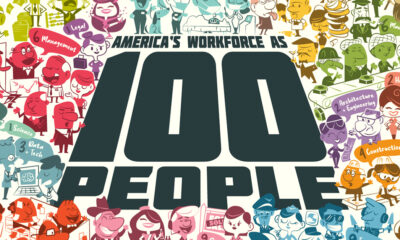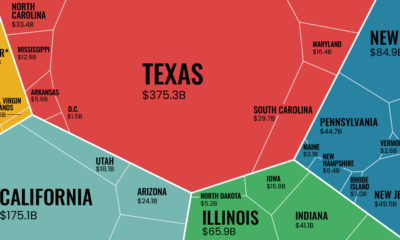Economy
Mapped: The State of Economic Freedom in 2023
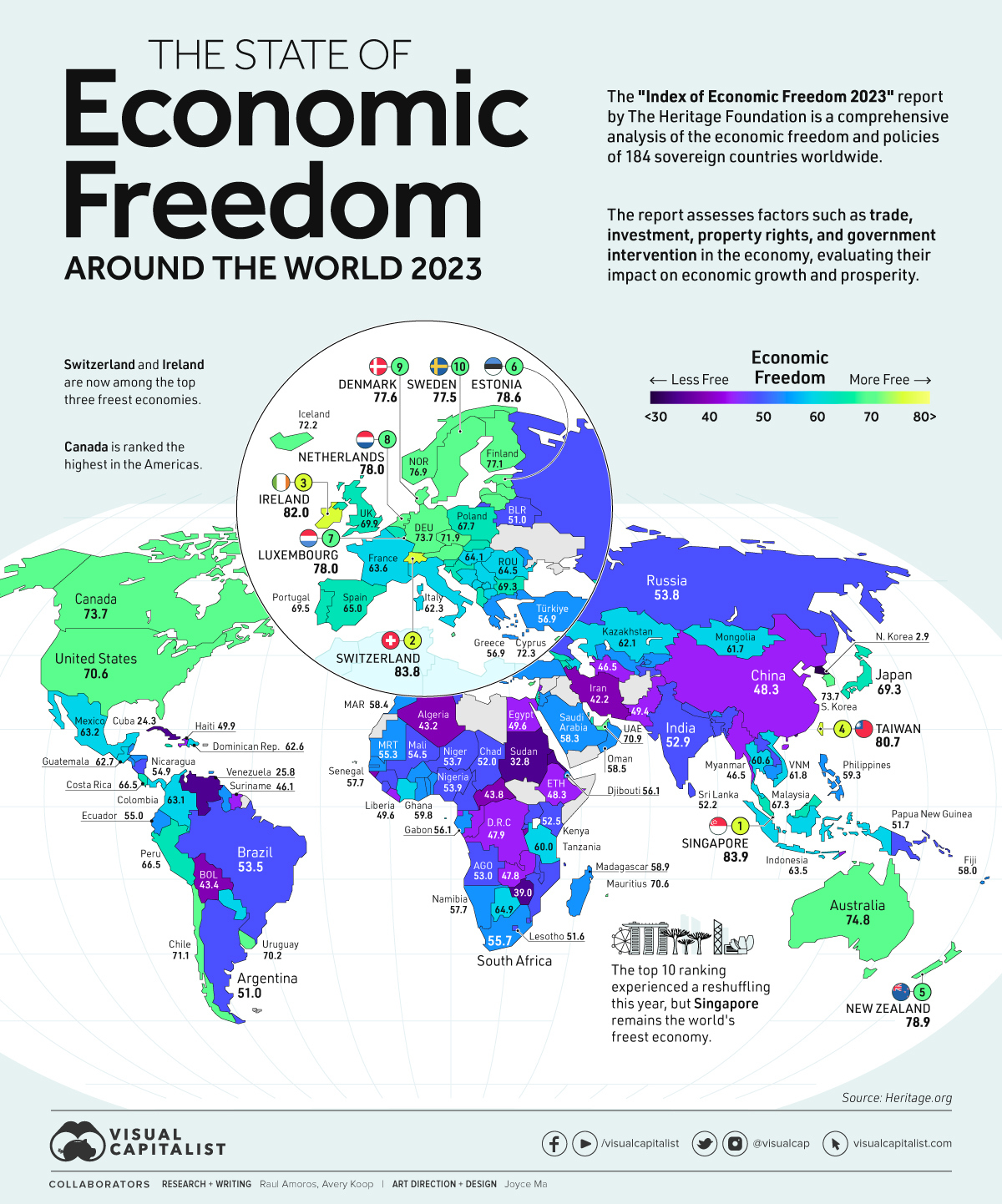
Mapped: The State of Economic Freedom in 2023
The concept of economic freedom serves as a vital framework for evaluating the extent to which individuals and businesses have the freedom to make economic decisions. In countries with low economic freedom, governments exert coercion and constraints on liberties, restricting choice for individuals and businesses, which can ultimately hinder prosperity.
The map above uses the annual Index of Economic Freedom from the Heritage Foundation to showcase the level of economic freedom in every country worldwide on a scale of 0-100, looking at factors like property rights, tax burdens, labor freedom, and so on.
The ranking categorizing scores of 80+ as free economies, 70-79.9 as mostly free, 60-69.9 as moderately free, 50-59.9 as mostly unfree, and 0-49.9 as repressed.
Measuring Economic Freedom
This ranking uses four broad categories with three key indicators each, both qualitative and quantitative, to measure economic freedom.
- Rule of law: property rights, judicial effectiveness, government integrity
- Size of government: tax burdens, fiscal health, government spending
- Regulatory efficiency: labor freedom, monetary freedom, business freedom
- Open markets: financial freedom, trade freedom, investment freedom
The 12 indicators are weighted equally and scored from 0-100. The overall score is then determined from the average of the 12 indicators.
Here’s a closer look at every country’s score:
| Rank | Country | 2023 Score |
|---|---|---|
| #1 | 🇸🇬 Singapore | 83.9 |
| #2 | 🇨🇭 Switzerland | 83.8 |
| #3 | 🇮🇪 Ireland | 82.0 |
| #4 | 🇹🇼 Taiwan | 80.7 |
| #5 | 🇳🇿 New Zealand | 78.9 |
| #6 | 🇪🇪 Estonia | 78.6 |
| #7 | 🇱🇺 Luxembourg | 78.4 |
| #8 | 🇳🇱 Netherlands | 78.0 |
| #9 | 🇩🇰 Denmark | 77.6 |
| #10 | 🇸🇪 Sweden | 77.5 |
| #11 | 🇫🇮 Finland | 77.1 |
| #12 | 🇳🇴 Norway | 76.9 |
| #13 | 🇦🇺 Australia | 74.8 |
| #14 | 🇩🇪 Germany | 73.7 |
| #15 | 🇰🇷 South Korea | 73.7 |
| #16 | 🇨🇦 Canada | 73.7 |
| #17 | 🇱🇻 Latvia | 72.8 |
| #18 | 🇨🇾 Cyprus | 72.3 |
| #19 | 🇮🇸 Iceland | 72.2 |
| #20 | 🇱🇹 Lithuania | 72.2 |
| #21 | 🇨🇿 Czechia | 71.9 |
| #22 | 🇨🇱 Chile | 71.1 |
| #23 | 🇦🇹 Austria | 71.1 |
| #24 | 🇦🇪 United Arab Emirates | 70.9 |
| #25 | 🇺🇸 United States | 70.6 |
| #26 | 🇲🇺 Mauritius | 70.6 |
| #27 | 🇺🇾 Uruguay | 70.2 |
| #28 | 🇬🇧 United Kingdom | 69.9 |
| #29 | 🇧🇧 Barbados | 69.8 |
| #30 | 🇵🇹 Portugal | 69.5 |
| #31 | 🇯🇵 Japan | 69.3 |
| #32 | 🇧🇬 Bulgaria | 69.3 |
| #33 | 🇸🇰 Slovakia | 69.0 |
| #34 | 🇮🇱 Israel | 68.9 |
| #35 | 🇬🇪 Georgia | 68.7 |
| #36 | 🇶🇦 Qatar | 68.6 |
| #37 | 🇸🇮 Slovenia | 68.5 |
| #38 | 🇼🇸 Samoa | 68.3 |
| #39 | 🇯🇲 Jamaica | 68.1 |
| #40 | 🇵🇱 Poland | 67.7 |
| #41 | 🇲🇹 Malta | 67.5 |
| #42 | 🇲🇾 Malaysia | 67.3 |
| #43 | 🇧🇪 Belgium | 67.1 |
| #44 | 🇵🇪 Peru | 66.5 |
| #45 | 🇨🇷 Costa Rica | 66.5 |
| #46 | 🇭🇷 Croatia | 66.4 |
| #47 | 🇨🇻 Cabo Verde | 65.8 |
| #48 | 🇧🇳 Brunei Darussalam | 65.7 |
| #49 | 🇦🇱 Albania | 65.3 |
| #50 | 🇦🇲 Armenia | 65.1 |
| #51 | 🇪🇸 Spain | 65.0 |
| #52 | 🇧🇼 Botswana | 64.9 |
| #53 | 🇷🇴 Romania | 64.5 |
| #54 | 🇭🇺 Hungary | 64.1 |
| #55 | 🇵🇦 Panama | 63.8 |
| #56 | 🇲🇰 North Macedonia | 63.7 |
| #57 | 🇫🇷 France | 63.6 |
| #58 | 🇷🇸 Serbia | 63.5 |
| #59 | 🇻🇨 Saint Vincent and the Grenadines | 63.5 |
| #60 | 🇮🇩 Indonesia | 63.5 |
| #61 | 🇲🇽 Mexico | 63.2 |
| #62 | 🇨🇴 Colombia | 63.1 |
| #63 | 🇧🇦 Bosnia and Herzegovina | 62.9 |
| #64 | 🇬🇹 Guatemala | 62.7 |
| #65 | 🇩🇴 Dominican Republic | 62.6 |
| #66 | 🇧🇸 The Bahamas | 62.6 |
| #67 | 🇫🇲 Micronesia | 62.6 |
| #68 | 🇧🇭 Bahrain | 62.5 |
| #69 | 🇮🇹 Italy | 62.3 |
| #70 | 🇻🇺 Vanuatu | 62.1 |
| #71 | 🇰🇿 Kazakhstan | 62.1 |
| #72 | 🇻🇳 Vietnam | 61.8 |
| #73 | 🇲🇳 Mongolia | 61.7 |
| #74 | 🇸🇹 São Tomé and Príncipe | 61.5 |
| #75 | 🇦🇿 Azerbaijan | 61.4 |
| #76 | 🇵🇾 Paraguay | 61.0 |
| #77 | 🇲🇪 Montenegro | 60.9 |
| #78 | 🇽🇰 Kosovo | 60.7 |
| #79 | 🇱🇨 Saint Lucia | 60.7 |
| #80 | 🇹🇭 Thailand | 60.6 |
| #81 | 🇨🇮 Côte d'Ivoire | 60.4 |
| #82 | 🇹🇴 Tonga | 60.0 |
| #83 | 🇹🇿 Tanzania | 60.0 |
| #84 | 🇧🇯 Benin | 59.8 |
| #85 | 🇧🇿 Belize | 59.8 |
| #86 | 🇩🇲 Dominica | 59.7 |
| #87 | 🇸🇨 Seychelles | 59.5 |
| #88 | 🇹🇹 Trinidad and Tobago | 59.5 |
| #89 | 🇵🇭 Philippines | 59.3 |
| #90 | 🇧🇹 Bhutan | 59.0 |
| #91 | 🇲🇬 Madagascar | 58.9 |
| #92 | 🇰🇮 Kiribati | 58.8 |
| #93 | 🇯🇴 Jordan | 58.8 |
| #94 | 🇭🇳 Honduras | 58.7 |
| #95 | 🇴🇲 Oman | 58.5 |
| #96 | 🇲🇩 Moldova | 58.5 |
| #97 | 🇲🇦 Morocco | 58.4 |
| #98 | 🇸🇦 Saudi Arabia | 58.3 |
| #99 | 🇬🇭 Ghana | 58.0 |
| #100 | 🇫🇯 Fiji | 58.0 |
| #101 | 🇬🇲 The Gambia | 57.9 |
| #102 | 🇳🇦 Namibia | 57.7 |
| #103 | 🇸🇳 Senegal | 57.7 |
| #104 | 🇹🇷 Türkiye | 56.9 |
| #105 | 🇬🇾 Guyana | 56.9 |
| #106 | 🇬🇷 Greece | 56.9 |
| #107 | 🇸🇧 Solomon Islands | 56.9 |
| #108 | 🇰🇼 Kuwait | 56.7 |
| #109 | 🇺🇿 Uzbekistan | 56.5 |
| #110 | 🇰🇭 Cambodia | 56.5 |
| #111 | 🇧🇫 Burkina Faso | 56.2 |
| #112 | 🇬🇦 Gabon | 56.1 |
| #113 | 🇩🇯 Djibouti | 56.1 |
| #114 | 🇸🇻 El Salvador | 56.0 |
| #115 | 🇰🇬 Kyrgyzstan | 55.8 |
| #116 | 🇿🇦 South Africa | 55.7 |
| #117 | 🇲🇷 Mauritania | 55.3 |
| #118 | 🇹🇬 Togo | 55.3 |
| #119 | 🇪🇨 Ecuador | 55.0 |
| #120 | 🇸🇿 Eswatini | 54.9 |
| #121 | 🇳🇮 Nicaragua | 54.9 |
| #122 | 🇲🇱 Mali | 54.5 |
| #123 | 🇧🇩 Bangladesh | 54.4 |
| #124 | 🇳🇬 Nigeria | 53.9 |
| #125 | 🇷🇺 Russia | 53.8 |
| #126 | 🇳🇪 Niger | 53.7 |
| #127 | 🇧🇷 Brazil | 53.5 |
| #128 | 🇰🇲 Comoros | 53.5 |
| #129 | 🇬🇳 Guinea | 53.2 |
| #130 | 🇦🇴 Angola | 53.0 |
| #131 | 🇮🇳 India | 52.9 |
| #132 | 🇹🇳 Tunisia | 52.9 |
| #133 | 🇲🇼 Malawi | 52.8 |
| #134 | 🇲🇿 Mozambique | 52.5 |
| #135 | 🇰🇪 Kenya | 52.5 |
| #136 | 🇱🇰 Sri Lanka | 52.2 |
| #137 | 🇷🇼 Rwanda | 52.2 |
| #138 | 🇹🇩 Chad | 52.0 |
| #139 | 🇨🇲 Cameroon | 51.9 |
| #140 | 🇵🇬 Papua New Guinea | 51.7 |
| #141 | 🇱🇸 Lesotho | 51.6 |
| #142 | 🇳🇵 Nepal | 51.4 |
| #143 | 🇺🇬 Uganda | 51.4 |
| #144 | 🇦🇷 Argentina | 51.0 |
| #145 | 🇧🇾 Belarus | 51.0 |
| #146 | 🇹🇯 Tajikistan | 50.6 |
| #147 | 🇱🇦 Laos | 50.3 |
| #148 | 🇸🇱 Sierra Leone | 50.2 |
| #149 | 🇭🇹 Haiti | 49.9 |
| #150 | 🇱🇷 Liberia | 49.6 |
| #151 | 🇪🇬 Egypt | 49.6 |
| #152 | 🇵🇰 Pakistan | 49.4 |
| #153 | 🇬🇶 Equatorial Guinea | 48.3 |
| #154 | 🇨🇳 China | 48.3 |
| #155 | 🇪🇹 Ethiopia | 48.3 |
| #156 | 🇨🇬 Congo | 48.1 |
| #157 | 🇨🇩 Democratic Republic of the Congo | 47.9 |
| #158 | 🇿🇲 Zambia | 47.8 |
| #159 | 🇹🇱 Timor-Leste | 47.2 |
| #160 | 🇲🇻 Maldives | 46.6 |
| #161 | 🇹🇲 Turkmenistan | 46.5 |
| #162 | 🇲🇲 Myanmar | 46.5 |
| #163 | 🇸🇷 Suriname | 46.1 |
| #164 | 🇱🇧 Lebanon | 45.6 |
| #165 | 🇬🇼 Guinea-Bissau | 44.6 |
| #166 | 🇨🇫 Central African Republic | 43.8 |
| #167 | 🇧🇴 Bolivia | 43.4 |
| #168 | 🇩🇿 Algeria | 43.2 |
| #169 | 🇮🇷 Iran | 42.2 |
| #170 | 🇧🇮 Burundi | 41.9 |
| #171 | 🇪🇷 Eritrea | 39.5 |
| #172 | 🇿🇼 Zimbabwe | 39.0 |
| #173 | 🇸🇩 Sudan | 32.8 |
| #174 | 🇻🇪 Venezuela | 25.8 |
| #175 | 🇨🇺 Cuba | 24.3 |
| #176 | 🇰🇵 North Korea | 2.9 |
| - | 🇮🇶 Iraq | N/A |
| - | 🇱🇾 Libya | N/A |
| - | 🇱🇮 Liechtenstein | N/A |
| - | Afghanistan | N/A |
Only four countries in the world have a score of 80 or above, Ireland, Singapore, Switzerland, and Taiwan, categorizing them as completely free economically.
Let’s now look at things from a more regional perspective.
Europe
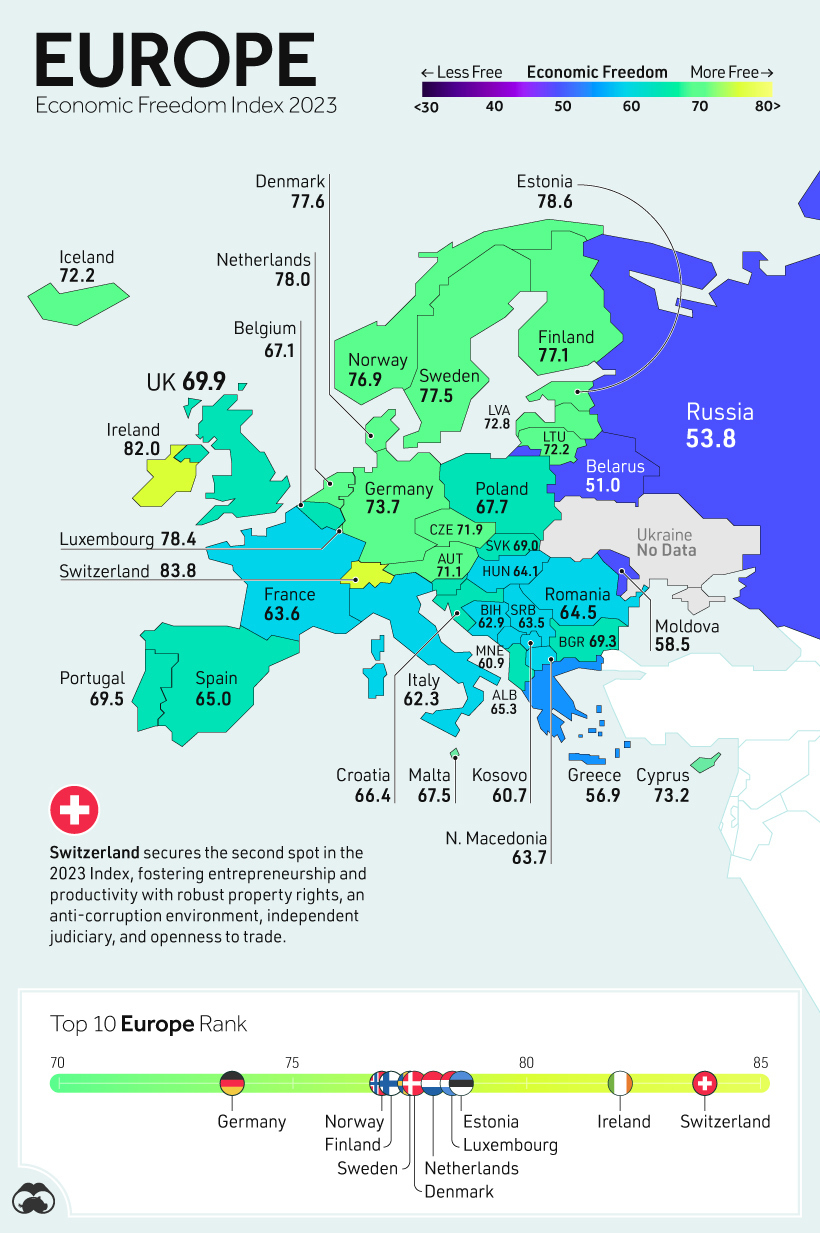
From a regional perspective, Europe ranks the strongest in economic freedom.
Despite being a powerhouse within Europe, Germany ranks 10th in the continent, with a score of 73.7. One of the categories Germany scored the weakest in was government spending (28.3/100). Over the last three years, government spending has averaged 49% of GDP.
Ireland ranks third globally, scoring particularly high in categories like property rights and judicial effectiveness. The country also has no minimum capital requirement—which is typically a banking regulation and corporate law issue determining how many assets an organization must hold—making it attractive for businesses to set up shop on the Emerald Isle.
Africa
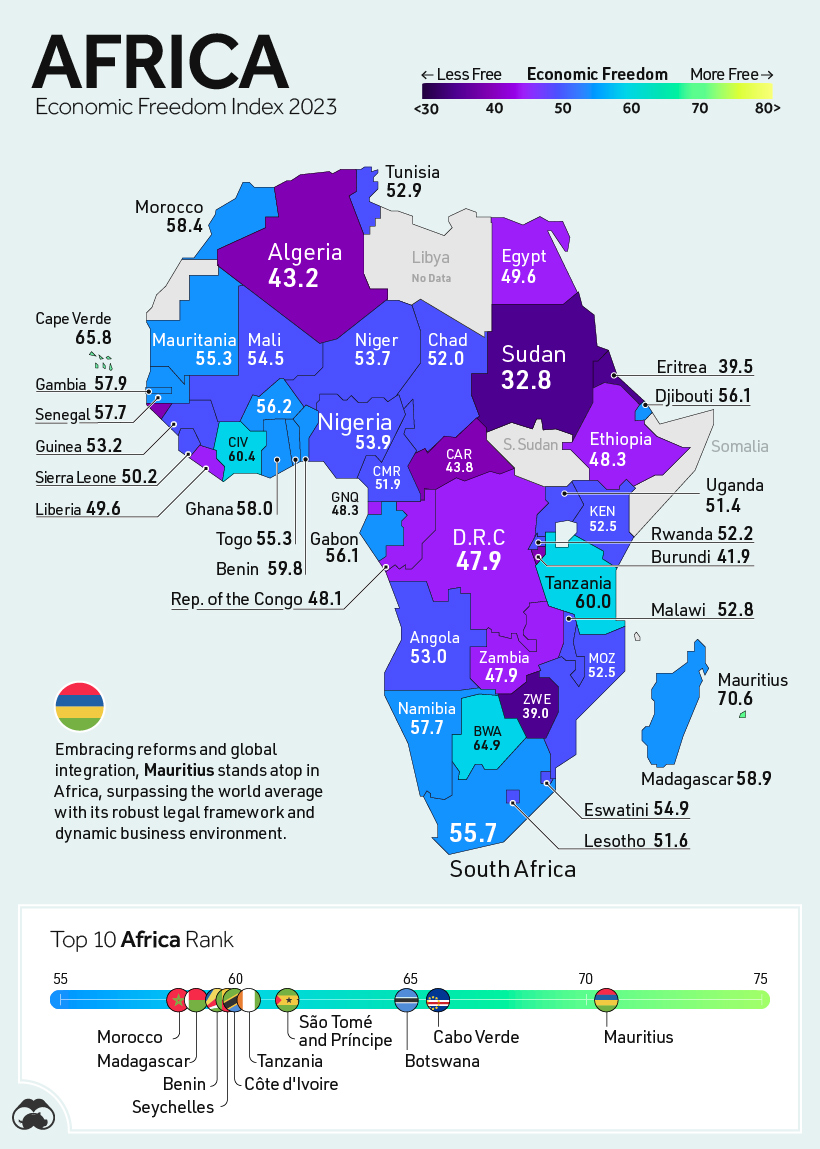
Currently, Africa is the continent with the least economic freedom in the world, however, it is also the region with the highest potential for economic growth. A booming population, and thus, labor force, are promising for future innovation. In fact, it’s anticipated that Africa will see an increase of 2.5 billion people by the end of the century.
The lowest scoring country in Africa is Sudan, a country under further strain thanks to rife civil conflict. Historically, economic development has been constrained by rampant corruption and a lack of institutional capacity.
Conversely, Botswana registered the highest score on continental Africa (64.9), ranking higher than countries like France and Italy.
The Americas
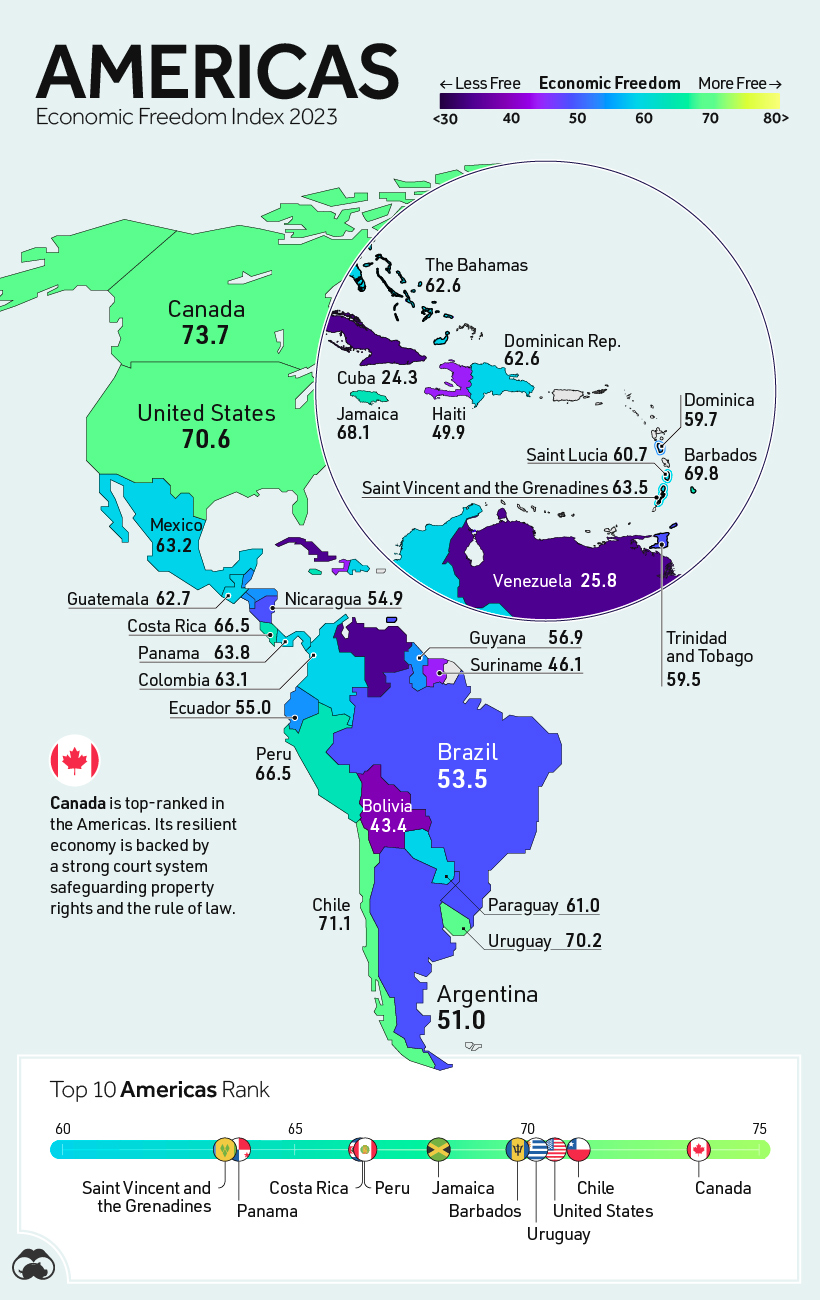
In the Americas, the United States ranks 3rd regionally—25th overall—with a score of 70.6. The report attributes the categorization of U.S. as only “mostly free” to issues like inflation, increasing government debt, and unchecked deficit spending. Public debt currently sits at a figure equivalent to more than 128% of GDP.
In South America, Chile comes out on top, ranking above many other economic powerhouses like the U.S., the UK, and Japan. However, the 2021 election of a new Constitutional Assembly could risk the current economic state, as it favors a much more socialist approach to the economy.
East Asia and Oceania

China’s score is among the lowest in East Asia & Oceania, ranking 154th in the world categorizing it as a repressed economy. The ruling Chinese Communist Party routinely exercises direct control over economic activity. China’s protectionist stance towards foreign investment and a plethora of trade tariffs imposed by other nations also factor in here.
In India, where public debt is equivalent to about 84% of GDP, fiscal health is the worst-scoring category. Additionally, much of the economy remains quite informal; a large share of people work in jobs without tax slips, recorded income, or formal contracts protecting them, which challenges labor freedoms.
The Middle East and Central Asia
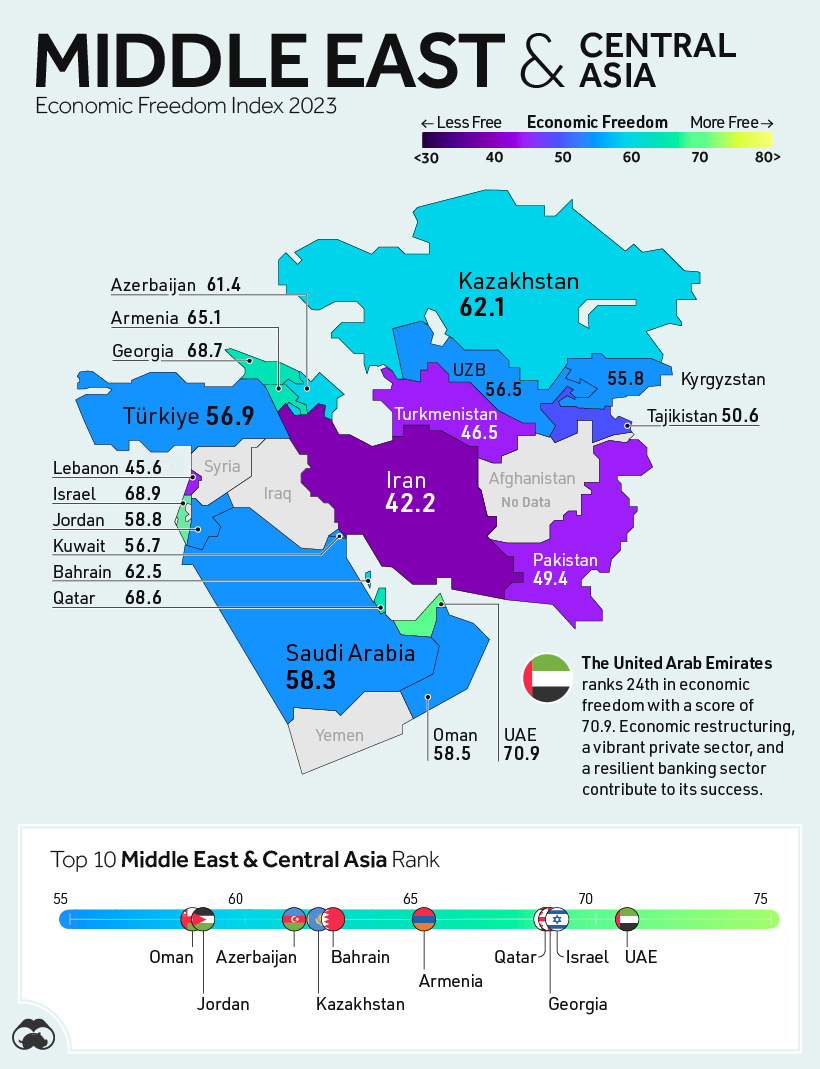
It may come as no surprise that the United Arab Emirates has the highest score in the Middle East. The UAE has implemented various measures and initiatives, such as tax exemptions, duty-free zones, streamlined business registration processes, and flexible regulatory frameworks to encourage entrepreneurship and foreign direct investment. As well, the top individual and corporate tax rates in the country are 0%.
Türkiye’s lowest scoring category relates to judiciary effectiveness and the rule of law. President Recep Tayyip Erdoğan, who has already been in power for two decades, recently won the country’s election, again cementing his authority over Turkish politics. This makes it unlikely that Türkiye’s economic freedom score will recover in the short to medium term.
Where Does This Data Come From?
Source: The Index of Economic Freedom from the Heritage Foundation
Data notes: A number of countries were not ranked due to unavailable data or other factors, like ongoing war, that made it difficult to properly assess the economy. These countries include: Ukraine, Afghanistan, Iraq, Libya, Liechtenstein, Somalia, Syria, and Yemen.
Politics
How Do Chinese Citizens Feel About Other Countries?
What is the Chinese public’s view of world powers? This visual breaks down Chinese sentiment towards other countries.
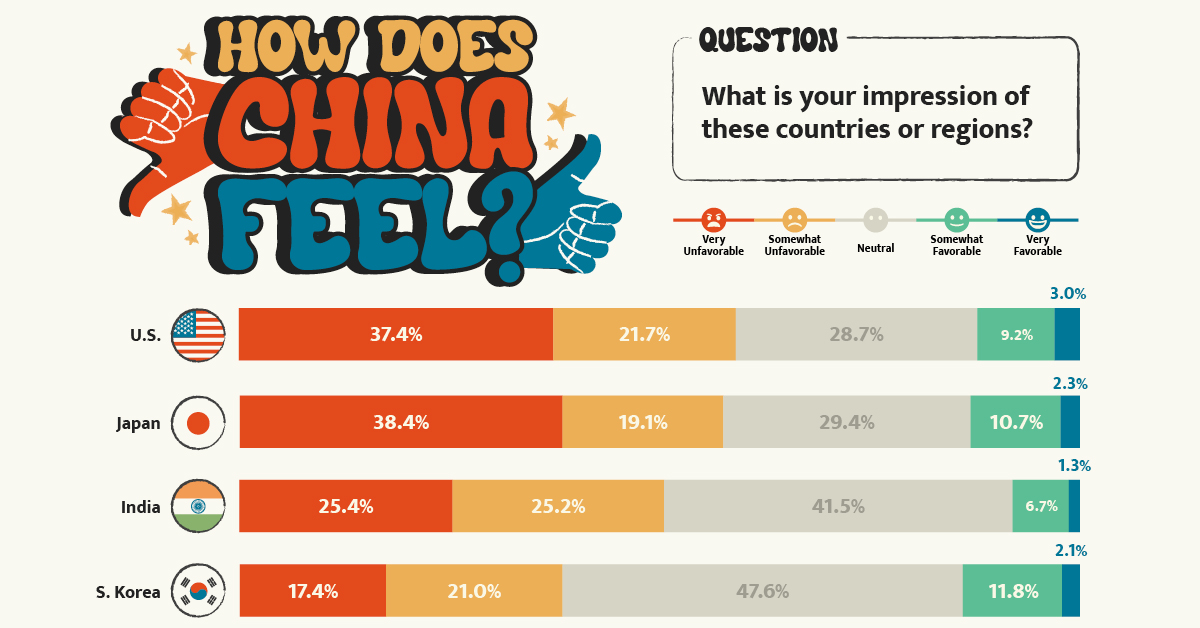
Public Opinion: How Chinese Citizens Feel About Other Countries
Tensions over Taiwan, the COVID-19 pandemic, trade, and the war in Ukraine have impacted Chinese sentiment towards other countries.
This visualization uses data from the Center for International Security and Strategy (CISS) at Tsinghua University to rank survey responses from the Chinese public on their attitudes towards countries and regions around the world.
Chinese Sentiment Towards Other Countries in 2023
In the Center’s opinion polls, which surveyed a random sample of more than 2,500 Chinese mainland adults in November 2022, Russia came out significantly ahead.
Just under 60% of respondents held Russia in a favorable view, with 19% seeing the country as “very favorable.” Contrast that to the mere 12% that viewed the U.S. in a positive light.
Here’s a closer look at the data. The percentages refer to the share of respondents that voted for said category.
| Country/Region | Very Unfavorable | Somewhat Unfavorable | Neutral | Somewhat Favorable | Very Favorable |
|---|---|---|---|---|---|
| 🇺🇸 United States | 37.4% | 21.7% | 28.7% | 9.2% | 3.0% |
| 🇯🇵 Japan | 38.4% | 19.1% | 29.4% | 10.7% | 2.3% |
| 🇮🇳 India | 25.4% | 25.2% | 41.5% | 6.7% | 1.3% |
| 🇰🇷 South Korea | 17.4% | 21.0% | 47.6% | 11.8% | 2.1% |
| 🇪🇺 European Union | 9.3% | 15.6% | 57.6% | 14.1% | 3.3% |
| Southeast Asia | 7.1% | 13.1% | 59.5% | 16.8% | 3.5% |
| 🇷🇺 Russia | 3.0% | 4.8% | 33.7% | 39.4% | 19.0% |
Japan ranked just below the U.S. in terms of overall unfavorability, though a slightly higher share of respondents saw Japan as “very unfavorable” compared to America. This is likely due to both modern tensions in the East China Sea over mutually claimed islands and historical tensions over the Sino-Japanese Wars.
Chinese sentiment towards India was also unfavorable at just over 50%, though notably the country also received the lowest favorability rating at just 8%.
Additional Survey Findings
The survey also found that 39% of Chinese people get their information on international security from Chinese state-run media (mainly through TV), with an additional 19% getting information from government websites and official social accounts. Conversely, only 1.7% get their news from foreign websites and foreign social media, partially due to the Great Firewall.
When asked about different international security issues, the biggest shares of Chinese citizens ranked the following as their top three:
- Pandemics (12.9%)
- Disputes over territory and territorial waters (12.9%)
- China-U.S. relations (12.0%)
The pandemic’s high score reflects the harsher impact COVID-19 had on China. Chinese borders were shut for years and the public faced intense measures to reduce spread.
In terms of other world events, the majority of Chinese people align with a more “Eastern” viewpoint. For example, in regards to the war in Ukraine, the report found that:
“About 80 percent of the respondents believe the U.S. and Western countries should be held most accountable [for the war], while less than ten percent of the respondents argue that Russia is mainly responsible.”– Center for International Security and Strategy, Tsinghua University
Overall, the views of the Chinese public reflect the opposite of those found in many Western countries. They provide an important insight that it is not just the Chinese government holding particular views about the world, but the Chinese public as well.
-

 Investor Education4 weeks ago
Investor Education4 weeks agoVisualizing BlackRock’s Top Equity Holdings
-

 apps2 weeks ago
apps2 weeks agoMeet the Competing Apps Battling for Twitter’s Market Share
-
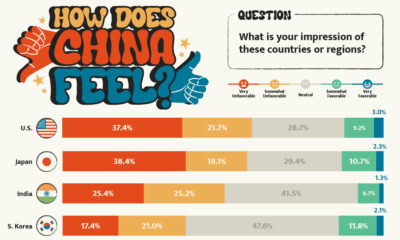
 Politics17 hours ago
Politics17 hours agoHow Do Chinese Citizens Feel About Other Countries?
-

 Markets4 weeks ago
Markets4 weeks agoVisualizing Every Company on the S&P 500 Index
-

 Markets2 weeks ago
Markets2 weeks agoVisualizing 1 Billion Square Feet of Empty Office Space
-
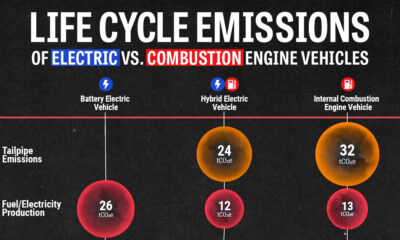
 Environment4 weeks ago
Environment4 weeks agoLife Cycle Emissions: EVs vs. Combustion Engine Vehicles
-
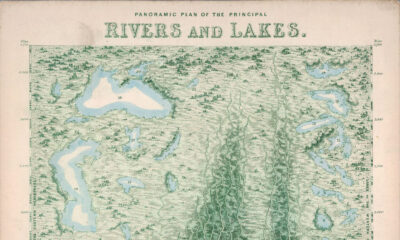
 Maps2 weeks ago
Maps2 weeks agoVintage Viz: The World’s Rivers and Lakes, Organized Neatly
-
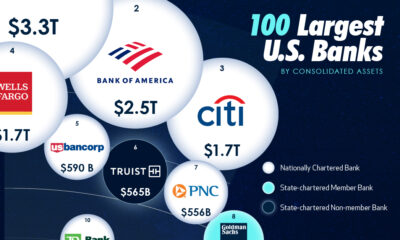
 United States3 weeks ago
United States3 weeks agoVisualized: The 100 Largest U.S. Banks by Consolidated Assets


